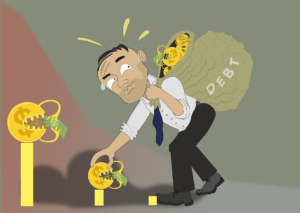Invest or Pay Off Debt?

Many people are torn between this decision. On one hand, you have to pay off this huge amount of debt that hangs over your head. On the other hand, there are opportunities to invest left, right and center! It’s only natural to not be clear on which one you should choose to focus on. However, we will go through some pros and cons for each section.
The idea of this blog will be to give you a better understanding of which avenue you should choose to focus on! It is important to note that the decision can be purely circumstantial. For example, one person is making more money from investing than the cost of having to make debt payments. It would make sense for that person to invest than to spend most of their money paying off debt. However, for who someone has huge debt payments, a lower income, and not much extra cash.
They would most likely want to go towards the route that leads to them being debt-free. The worst kind of debt you can have is a credit card because it has such a high interest rate. It would be advantageous to pay off your credit card debt before any investing, regardless of financial status. Now, onto the pros and cons!
Contents
| Reduce Debt | Invest |
| Pros | Pros |
| Lower Debt | Make That Money |
| Creates Opportunities | Save On Taxes |
| Less Stress | Improve Spending Habits |
| No More Wasted Money | Increase Knowledge |
| Cons | Cons |
| Budget | Debt Lingers |
| Shouldn’t Invest | Risk |
Reduce Debt
Pros
Lower Debt
The first huge advantage is self-explanatory, you get to reduce your debt. This can have many psychological and physical benefits. Your money is free which means you do whatever you want with it. Also, it shows that you manage your risk properly which can have positive effects on your credit score & credit history!
There is also the psychological benefit of not having to worry about making monthly credit card interest payments. When debt is paid off, you feel like a weight is being lifted off of you should. You feel invisible in a sense and it allows you to focus on other aspects of your life. These other aspects do not have to be strictly financial.
Creates Opportunities
Maybe one day you want an appetizer with your meal or to take singing classes like you always dreamed. Lowering your debt can be a gateway to a lot of amazing opportunities. Many opportunities are created once you’re debt free. Some would say that you can truly invest once you’re debt free because at times you may want to acquire more debt to make those investments!
A great example is a house, having a mortgage is like having a huge debt. Many people buy houses while having so much debt already which means their focus is now split. They have this gigantic mortgage that costs thousands of dollars a month and many other debts that require payment!
This can lead to an EXTREMELY stressful situation where your monthly debt may overshadow your monthly income. Therefore, it would be optimal to have only a few manageable debts at the same time
Less Stress
My absolute favorite benefit of paying off debt is less stress. Stress can cause many short-term and long-term problems. Stress can make you lose weight, gain weight, lose sleep, lose appetite, gain acne and many more negative side effects. Its only natural that we will want to reduce this as much as possible. When you’re stress-free, you make more clear and concise decisions.
No More Wasted Money
The most notable physical change you’ll see is the money you’ll save. The wasted money I’m referring to is interest payments. These are how every bank makes a great deal of their money. Interest is additional money you pay on top of your main payments as a charge for paying over a certain amount of time. In some instances, these interest payments can be small but this is not always the case.
For example, I recently finished finance on a $2,000 laptop I bought. The finance was for 6 months at 0% but 40% annual interest charge on the FULL AMOUNT after 6 months. This means if I hadn’t finished the monthly payment, id be charged over $60 a month in interest.
Avoiding situations like these is what I mean by not wasting any money. Credit cards are the worst for this because it has a snowball effect for the interest. If you need more on how you can reduce debt, try The Spenders Guide To Debt-Free Living! You can also take a look at these 4 Simple Steps To Reduce Debt!
Cons
Budget, Budget, Budget!
When paying back your credit card, budgeting is a HUGE factor that plays into paying the debt back. This means not being able to spend carelessly. Although it does create good habits, your quality of life goes down (depending on your standards). When budgeting you must learn to spend money on things that are a necessity. Although you can have a little bit a wiggle room here and there. Doing this only makes the process of reducing debt slower.
A coffee here and there may not seem like much but that money adds up. $2 for coffee 5 days a week may just seem like $2. However, if you were to add this up on a yearly basis, that’s $480! To some, this still may not seem like a lot but for many it is!
Can’t or Shouldn’t Invest
Not being able to invest is a huge con (in my opinion) when focusing on reducing debt. This means that whatever money you have isn’t being put to its full use! When you have money, the best thing you can do with it (depending on the situation) makes it work for you. This is one of the key elements in developing true financial independence. Focusing on paying off debt can make this journey longer.
Missed opportunities can be a huge deterring factor as well. We all know someone or had it happen to us, we were presented with an opportunity and didn’t take it. Many of us have our reason but a lot of my missed opportunities were due to not wanting to throw myself into debt. The irony of it all is that if I took some of those risks, I wouldn’t be in debt right now.
Invest
Pros
Make That Money
Investing plays a huge role when one is trying to achieve a degree of financial independence. As previously stated, investing makes your money work for you. When you invest, you’re taking on a certain degree of risk. However, it allows you to generate income while dedicating your time to other things. For example, you could invest your money in stock while working at your full-time job. A week passes and that stock increases in value.
You can now sell that stock for more money than you invested. Furthermore, you would receive any sort of income you made from a job. The more money you invest equals the more of a return you get. However, generating income from investing isn’t necessarily a short term goal, it’s meant to be long term in some instances.
Save On Taxes
Everyone loves to save money, but investing can save you money on taxes. If you were to invest into an RRSP, your taxable income would decrease meaning you’d owe less on taxes. Not only that but when its time to retire, you’ll have a solid income stream coming in from this retirement plan!
Another way to save on taxes is with a TFSA! If you have this account you can effectively save on paying taxes for profits that you receive from other investments. Therefore, you can use the money that you saved to either reinvest or pay off some debt as well.
Improve Spending Habits
Investing, especially at an early age, has the ability to develop positive spending habits. You’ll learn what to spend your money on and whats typically worth it. People will often learn the difference between an appreciating and depreciating asset. They will be able to make better judgment calls and determine what exactly is needed in their life.
Everyone I know who is wealthy does not overindulge in unnecessary items. That being said, being frugal is just a common trait among those who are wealthy. Some people love n expensive lifestyle so they have that even when they have money.
Increase knowledge
Increasing your knowledge in finance has many benefits in itself. You’re already miles ahead of those who do not have knowledge of personal finance. When you’re struggling, you’ll know exactly what you can do to improve your current situation. You also are better with managing risk considering you do it on a regular basis.
With this wealth of knowledge, you can help those who are struggling as well. Providing friendly and sound advice on how they can increase their quality of life as well. Knowledge is truly power and it can truly be applicable in many aspects of life!
Cons
Debt Lingers
If you were to invest instead of paying off your debt. The debt will still remain there which can cause a multitude of problems. As stated this can lead to longer and higher interest payments. Stricter budgeting if you need to pay back debt but focus most of your funds towards investments. Increased stress due to still having the debt hanging over your head is a huge factor as well.
Risk
The biggest problem would be the risk. Investing comes with risk no matter which one you choose. In the odd chance that something negative happens, you could lose your investment. Imagine you have student debt of $20,000 and make an investment. However, the investment goes south and it causes you to lose $10,000.
You are now even further in debt than you were before which can be a huge problem. When investing you must see if the positives outweigh the negatives. Also, you have to see what degree of risk you’re willing to take. Although investing is a great strategy to create income, it can leave you in the worst position.
Summary
Paying off debt and investing both have worthy pros and cons. However, the decision is strictly based off of your financial and mental situation. If you have huge amounts of debt with high interest, it would be best to focus on the debt. If you have minimal debt and a lot of extra money, investing would be a good way to put it to use.
Although, this isn’t to say you can’t do both. When paying off debt, you can pay yourself a very small amount from each paycheck. This can be used to put into some sort of high-interest savings account, mutual find or bond. A relatively low risk investment that has an interest pay out!

Shameed is just a man on a mission to help those around him gain financial success. Obsessed with writing about all things finance, this GTA native is constantly learning and sharing his experiences with others.














